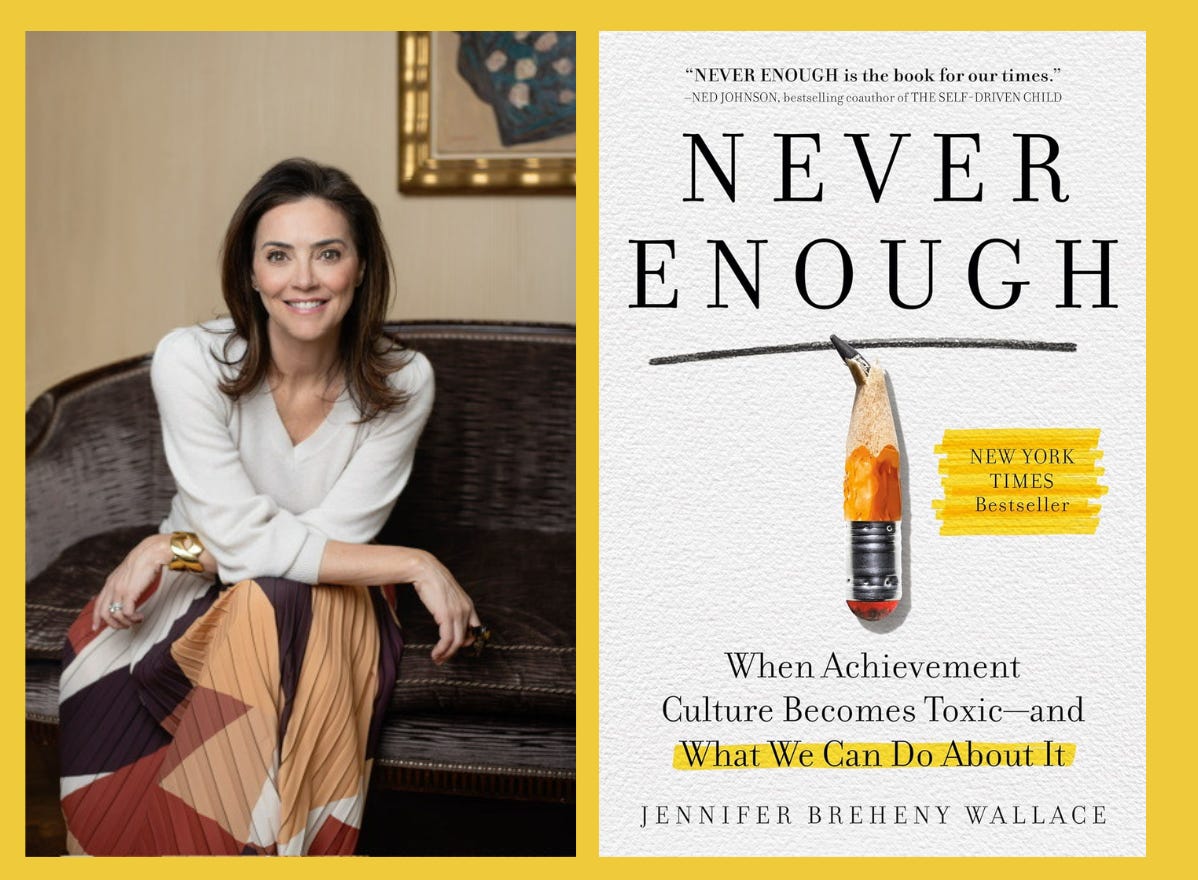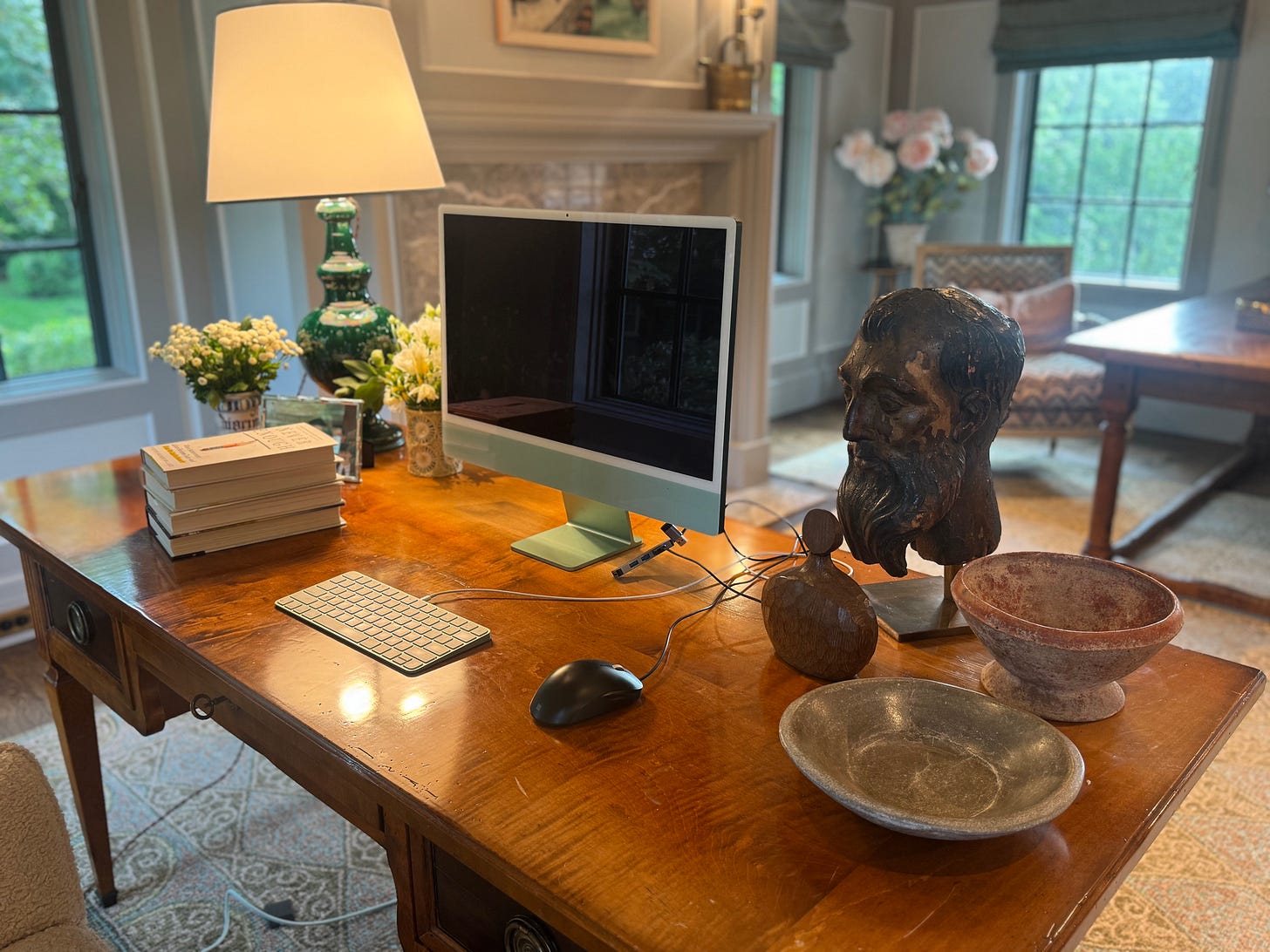Why Jennifer Breheny Wallace Wakes Up at 4 A.M. to Write
21 questions with the bestselling Never Enough author on deep work, generous feedback, and writing with purpose.
If you’ve ever worried that you’re not doing enough, or that your worth is tied to your work, Jennifer Breheny Wallace has a message for you: You matter.
Jennifer is a longtime journalist and the bestselling author of Never Enough: When Achievement Culture Becomes Toxic-and What We Can Do About It and the upcoming Mattering: The Secret to a Life of Deep Connection and Purpose (January 2026). Her books explore the roots of achievement culture, burnout, and belonging, and what we can do about them.
But Jennifer isn’t just a sharp observer of our modern condition; she’s also a disciplined, deeply practical writer who treats feedback as fuel and finds inspiration in unlikely places.
In this edition of Author Insider’s 21 Questions, Jennifer shares how she protects her time, how AI challenges her thinking, and what she wishes more writers understood about the job.
—Panio
21 Questions for Jennifer Breheny Wallace
1. I couldn’t have written my last book without… my friends. They are my secret weapon. They’re amazing sounding boards at every stage of the process. They cheer me on. They push me to take risks. They let me borrow their courage when I need it. And they give me honest feedback when I ask for it. What might feel like criticism to some people, I see as care. My people care enough about me to invest in me and to tell me what I need to hear. To me, feedback is an act of love and support.
2. What’s the thing most people get wrong about being a writer? My first job out of college was working with the brilliant New Yorker writer Ved Mehta. Through modeling, he taught me how to sit in the chair and do the work, break for lunch, and then return to the chair and keep doing the work. You don’t wait for inspiration to come. It’s in the consistent doing, day in and day out, that inspiration strikes. Writing is a job, like any other job. The magic comes in the discipline.
3. What’s something you wish you’d started doing five years ago? I wish I had been more disciplined about building a newsletter.
4. Hemingway wrote standing up; Edith Wharton, lying down. What are your quirks? When I need to do deep work, I put on a construction-grade noise-canceling headset so I don’t hear outside noise or interruptions. I also surround myself with inspiration. For example, behind my desk is a wall of sketches of hands, feet, ears, and profiles. These are practice studies artists did before taking on a painting or sculpture. I started collecting them while writing my first book, Never Enough, when I was frustrated by how many drafts it took to get it right. I felt like I was failing. But, these pieces remind me that drafts are an essential part of the creative process.
I also keep a small, porcelain lion on my desk as a reminder to protect my boundaries around my thinking and writing. When I feel myself being pulled off course, I look at the lion and remember to hold my boundary. I think that’s one of the hardest parts about being a writer—the discipline to say no to things that get in your way.
5. Do you read your reviews? Yes, I’m a glutton for feedback.
6. What income streams make up your writing business? Book advances and speaking engagements are my primary sources of income.
7. Is there a book you wish you’d written? Evicted: Poverty and Profit in the American City by Matthew Desmond. What a masterpiece in reporting and storytelling.
8. What keeps you up at night? What is going to happen to the millions of people whose jobs will be impacted by AI?
9. Have any tech tools made your job easier? Everything I write is on Google Docs. That’s my only tool.
10. Where do you find new ideas? Thanks to some great mentors, I’ve learned how to spot trends. Essentially, I pay attention to what keeps coming up—in conversations with friends, in articles, at school or work events, and even in conversations I overhear on the bus. What are people talking about at cocktail parties? What are my friends concerned about? What am I struggling with? When I notice the same theme showing up in different places, I get curious and dig into the research to see if anyone is studying it. So, I start by listening. Then I follow the thread wherever it leads me.
11. How do you keep track of new ideas? It’s a super basic system. I have Google Docs for various topics, including potential article ideas, marketing ideas for my books, and stories or research to include for future talks I’ll be giving, etc. I’d be lost without my Google Docs.
12. What is the one piece of advice you would give to recent graduates that want to make a living as a writer? Surround yourself with excellent mentors. Be open to feedback. Be humble, be coachable, stay nimble, and always be ready to pivot when the industry inevitably changes. And read, read, read.
13. Whose career do you most admire and why? So many! Ina Garten, Arianna Huffington, Katie Couric, Gretchen Rubin, Lisa Damour, and Kelly Corrigan, just to name a few! They are all hard workers. They add real value to the world. They are kind and generous, and they consistently excel at what they do.
14. How did you find your agent? My agent is Christy Fletcher at UTA. Several friends in the publishing industry recommended her, and it was love at first sight. It’s been a wonderful partnership.
15. How has AI changed your writing process? I use AI to challenge my arguments by asking it to poke holes in them. You’re probably sensing a pattern with me: I use AI as another form of feedback.
16. Coffee, tea, or something stronger? Coffee in the morning and green tea in the afternoon.
17. How many drafts before you show your editor? I like the manuscript to be in really good shape before I send it to my editor. Ideally, I want to avoid her having to read draft after draft. So I have other trusted early readers review various drafts first. When I think the manuscript is in solid shape, I send it along to my editor for a fresh read.
18. Can you describe your ideal workday? When I’m writing a book or on a deadline, I get my best work done at 4am. That’s before my inner critic wakes up, so I don’t feel the impulse to self-edit. Instead, I let the words pour onto the page. I’ll write straight from 4am to 7:15am (when my kids get up to go to school), and then go back to it at 8am, after my kids leave. What I’ve learned about myself over the years is that I’m someone who needs to carve out solid blocks of uninterrupted time to think and write. Give me a 4-hour block, and I’m in heaven.
19. How does that compare to your actual workday? Happily, pretty similar! I’m very consistent. Even when I was freelancing, I gave myself a 40-hour week—and I was strict about it. I’ve been researching and writing for 40+ hours a week for 12 years. As soon as I wake up, I pour myself a cup of coffee and get to writing. I do my best writing before 3pm – after that, my brain is fried. That’s when I turn to the nonwriting parts of the job (researching, interviewing, social media, etc).
20. What do you wish you’d known when you were starting out? People in the media industry (magazines, newspapers, television, books, etc) are so busy. If you don’t hear back about a pitch or story idea, it’s not personal. Wait a couple of weeks and reach out again. If you don’t hear back again, pivot and pitch it to someone else.
21. What is your new book about? Mattering: The Secret to a Life of Deep Connection and Purpose is about the universal human need to feel valued and to add value to the world. Right now, that need is going unmet for far too many people—and it’s showing up as anxiety, loneliness, burnout, and despair. But the hopeful part is that mattering is highly actionable. It’s something we can actively build in our relationships, in our workplaces, and our society at large. Mattering is a roadmap for how to meet that need in ourselves and others.
We’re all figuring out how to write, work, and matter. What’s something that’s helped you stay grounded or creative? Drop your thoughts in the comments and join the conversation.




Jennifer Wallace wakes up to write at 4am! That's extraordinary.
I always loved the detail that Nicholson Baker set an alarm for something like 3am, wrote for 2 hours, and then went back to sleep and woke up with his family ... and then wrote again. There is something about the cleanliness of the brain when you first wake up, like a beach wiped clean by the ocean, that is special.